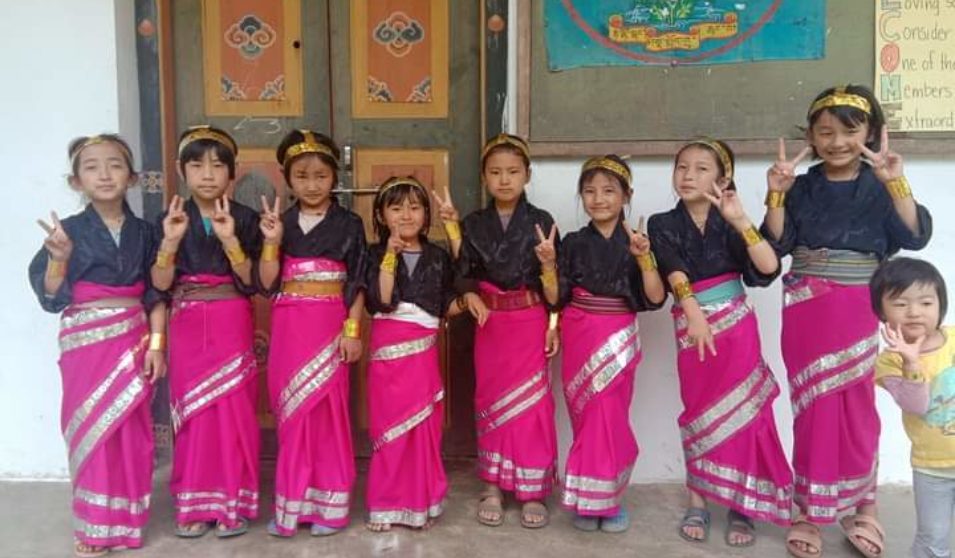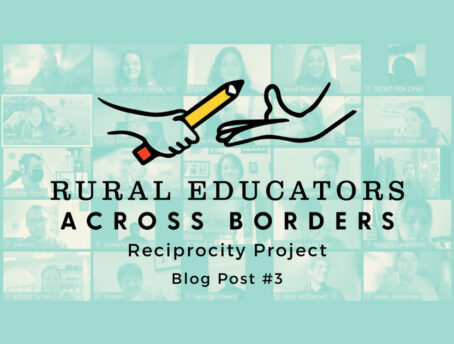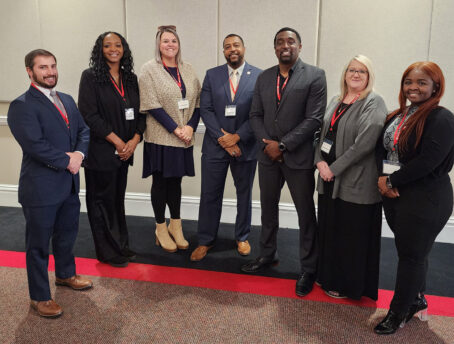Through the Rural Educators Across Borders program, Rural Schools Collaborative has had the opportunity to speak with educators from around the world in both live events and one-on-one interviews. Recently our team interviewed Kinley Zam, a teacher in rural Bhutan, about her perspective and the implementation of place-based education in her school.
Kinley graduated with a B.Ed from Paro College of Education, which specializes in training teachers, and went on to complete an MA in English Linguistics and Literature through the Royal Government of Bhutan Scholarship from Yonphula Centenary College at the Royal University of Bhutan. She currently instructs children from ages 5 to 17 at the Gakidh Village School in the Punakha District of Bhutan. Kinley describes her school as “cozy,” with just five teachers, 32 students, four classrooms, an office, a store, a library, and on-campus lodging for the teachers. The school is surrounded by oak, alder, rhododendron, and cypress trees. Although she has taught in several places over her 11 years of teaching, Kinley explains that rural is where her heart truly lies:
“During these years of teaching, I served only rural schools. Prior to joining this school I taught in one of the remotest schools here, which is about three days’ walk through the forest without any power or telecommunication. Being born and brought up in a rural community, I feel connected to this place. I strongly feel that it is my duty to extend my gratitude through my service to the community for what the place offered me from my birth till today. I take it as my responsibility to nurture the children of this community by being a role model, and I take pride in rendering my service. The credit for who I am today and where I am standing today is solely rooted in this community.”
Kinley shares that the school system in Bhutan provides free education to all children, and His Majesty the Fifth King of Bhutan and the government give top priority in providing them with the best of the best. With the aim of creating well-rounded citizens, the Bhutanese education model emphasizes social-emotional and practical aspects in addition to rigorous academics and up-to-date technology:
“The system aspires to nurture individuals who are locally rooted and globally competent through providing them 21st century skills to fit in the fast-changing and developing world. Through the enhancement of critical thinking and analytical thinking, they become aware of the changing world around them and gain ideas to handle the change-driven future in their life. We also provide ample opportunities for children to explore scientific technology and informational technology to acquaint them with demanding science and technology of the world. One example of such an opportunity is the Code Monkey Project, which familiarizes children with coding skills.”
Another concept unique to Bhutan is Gross National Happiness (GNH). A turn on the phrase “Gross National Product,” GNH focuses more on personal satisfaction and community connection than economic production. Kinley explains:
“This country focuses on building competent citizens through wholesome development of an individual’s social, emotional, and psychological aspects. We also give importance in imparting values to fulfill the aspiration of our country’s philosophy of Gross National Happiness. With the values imparted on them, the education system aspires for children to remain attached, connected, and appreciative of the country’s rich culture, ecology, unique governmental system, and growing economy.”
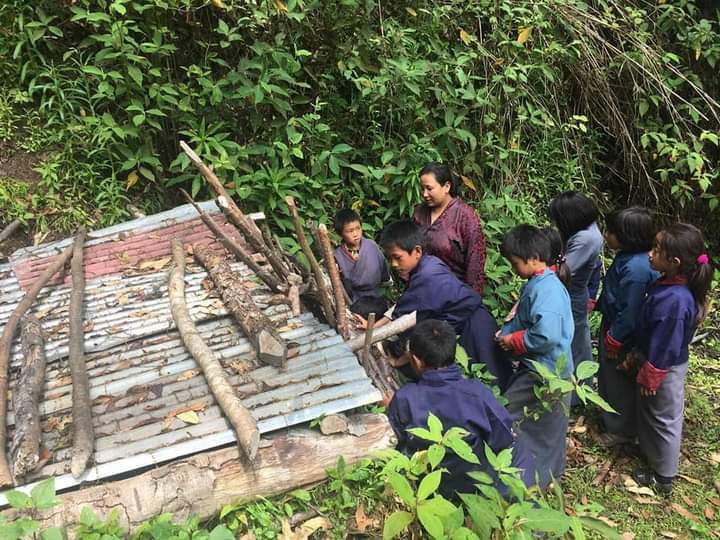
The school reflects these values by involving the community and building relationships with families. Like in many rural places, teachers are seen as leaders in the community and act as agents for change.
“Yes, teachers play a greater role in bringing positive change in the community,” Kinley affirms. “My students and I share a very special relationship; we share a child-parent relationship. I am not just a teacher for them but somebody close to them whom they can rely upon during all times of ups and downs. Even their parents feel close to me, and we work together in nurturing their children. Parents are also involved in different school activities. We have parent representatives as members of the school community, and the village head as the chairperson for the school management board. Parents render support in carrying out the school’s annual rituals, carrying out major maintenance work, and serve as content experts in everyday teaching and learning processes whenever topics or lessons related to imparting community knowledge are needed. They also take part in important decision making of the school.”
When thinking about her return to a rural place, and specifically her pull to Gakidh, Kinley reflected on how rural gives her the opportunity to effectively utilize place-based education. First intrigued by the concept after a training with Teton Science Schools, Kinley worked with TSS to find a way to use the place-based model to improve her community:
“It is my passion towards teaching rural children that set my mind here. Most importantly, it is my passion towards the place-based education approach that drove me here. I felt that this is the right school to realize all the dreams I had about rural community and rural children, and to put the place-based education approach into practice. I want to contribute to this community by helping the village children gain contextualized education through increasing their awareness of self, others, and place–thus fulfilling my role as a teacher by contributing towards His Majesty’s vision of producing citizens who are locally rooted and globally competent in the best of my ability. Their level of understanding, observation, spoken language, confidence and social skills have greatly improved [through place-based education]. I personally feel that a person who understands his or her roots can only grow up to be a better citizen.”
She explains how the school’s focus on place-based education “receives support from various stakeholders and agencies, including the Ministry of Education, Bhutan Youth Development Fund, and Teton Science Schools in gathering resources and the capacity building of educators in school.” Kinley continues, “Teton Science Schools works closely with my school and helps the school in capacity-building of the educators here by sending fellows every year. So far, we’ve received two teachers [through] the fellowship program, and they gave us hands-on experiences in applying the PBE approach. I am indeed very thankful for this support as they really helped me in expanding what I already know about the PBE approach.”
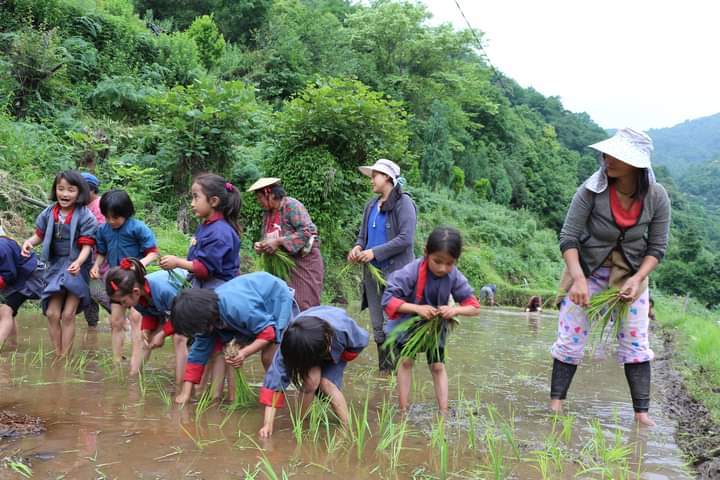
Many of the same challenges faced by teachers in the United States carry over in rural Bhutan. Kinley explains that a teacher shortage, remoteness, and inconsistent internet access make it difficult to give village children what they need to succeed:
“People’s exposure to information technology and English language is minimal, so teaching English language and helping children handle IT is challenging. The current school that I am serving is connected with a rough road to the highway. It has a good power connection, and enjoys all the public services, but there are some issues with telecommunications. We often have to access hotspots from our phones by keeping them in a place where we can access the 4G network, which is very slow. Some of our children walk for more than an hour [to school] every day, and it is very difficult during monsoon season. ”
However, Kinley reports that teachers are ready and eager to jump in and support their students, and being rural in Bhutan offers some distinct advantages as well:
“We get to understand the rural life better, and we learn to use the resources in the best possible way. We can be the best change makers. We learn to innovate. We adjust with the demanding nature of rural life. The school supports disadvantaged students. We help them get enrolled as a beneficiary under His Majesty’s program called Kidu. All the necessary expenses for the child enrolled are supported by His Majesty the King. We also look for donors who can help us meet the expenses of disadvantaged children. Academically we conduct remedial classes, provide constructive feedback and work closely with their parents to help them.”
Reflecting on the definition of “rural,” Kinley shares that it denotes “a community that has its own beauty. It is original and a place where real traditional values, culture, and ecology exist. It is not man-crafted like a sophisticated urban place. It is raw, but every rural place has got something real, beautiful, valuable and original to offer to the nation. A recent lesson I enjoyed the most was teaching the children the names of trees in their community. This was done as a part of an English lesson, but we could make it an interdisciplinary lesson by bringing in Dzongkha (our national language).”
Kinley believes rural places can thrive through a place-based education model, not just in her community but in rural communities around the globe:
“I hope in the future children and people become more aware of self, others, and community, and reduce rural-urban migration. I also hope that each child who graduates from this school grows up to be a true citizen who can be responsive to the fast-changing world without compromising their originality of who they are, where they are from, and for whom they belong.”
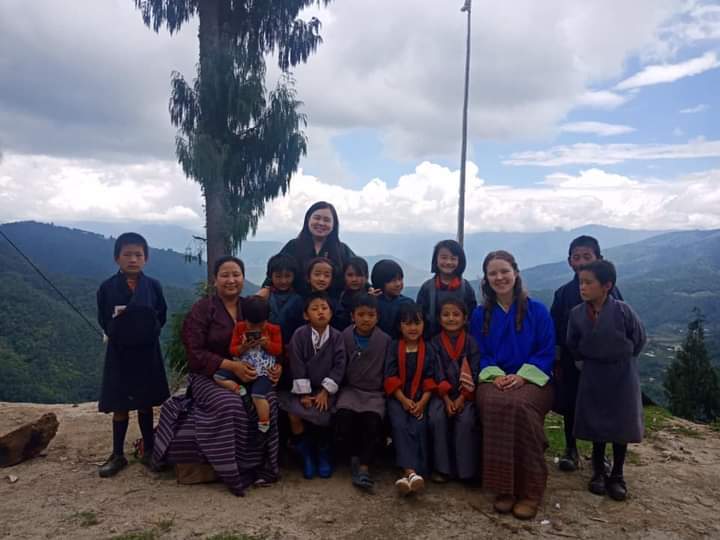
We are grateful to Kinley for sharing her story with us about her experience as a teacher in rural Bhutan. If you would like to share 30 minutes of your time for an interview, please reach out to us at info@ruralschoolscollaborative.org. The I Am A Rural Teacher campaign is a collaborative effort with the National Rural Education Association and made possible through a grant from the Bill & Melinda Gates Foundation. Learn more about the Rural Educators Across Borders program here.

